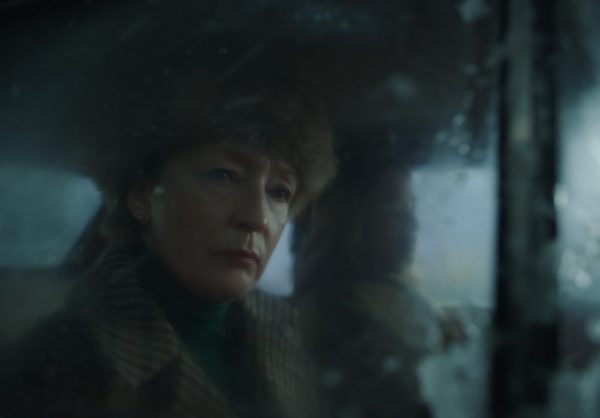
German director Ulrich Köhler’s Gavagai attempts to play upon its title, focusing on the idea of misunderstanding. Gavagai, a made-up word popularized by philosopher Willard Van Orman Quine, looks at translation of a word––or in this film, translation of a situation––which can be viewed differently by several characters involved. In this case the situation is between a hotel security guard and the fictional and actual film’s central actor, Nourou (Jean-Christophe Folly), a Black man attending the Berlin Film Festival as an honoree.
The director finds himself working through a meta-narrative, following the on-set romance and tensions between co-stars during the filming and then premiere of an updated Medea. Köhler, much like the eponymous name of his film, has no intention of explaining the meaning of this story. He draws on the racial tensions of the current world, looking at our collective moral uncertainty.
Nourou sits opposite his white co-star, Maja (Maren Eggert), as they circle one another over the course of the film. Maja becomes protective of her ex-lover during and after the security incident, beginning a series of escalating moments between them. She has enough anger for both of them. Maja cannot let the incident go; rather, she makes it her mission to see the guard dismissed, much to her co-star’s frustration. Nourou wants to continue onward, to focus on the possibilities within their relationship, but Maja is intent on this crusade.
Köhler’s film becomes full of these moral grey areas, yet the director seems only interested in presentation. He has no intention of giving his audience any semblance of the “right” thing to do. He wants to show the viewer a situation and allow each of us to respond. Would we be full of righteous fury? Would we allow Nourou to handle it however he’d like? And what role does love, or lust, play in a situation of moral indecision?
To his credit, Folly is tremendous in this central role. His face remains impassive throughout, moving through this story with an easy emotional fluidity. Yes, he shows his disappointment through a dropped smile and his joy by flashing his teeth, but there’s a constant stoicism within his demeanor. He’s been through this before with both the security guard and Maja. His love for her outweighs any other feeling.
Gavagai turns its attention towards the film within the film, the reimagining of Medea set in Senegal, with a much more French ending than Euripides’ original play. It’s a film made by a white woman (resembling many current European auteurs) asking for unbridled emotion from her stars, providing scraps to her Black extras, and willing to answer reporters’ questions with a sense of interesting entitlement to tell whichever stories she’d like.
Köhler’s feature contains threads upon threads of commentary, wrapped in four languages and meta storytelling. His unwillingness to provide clarity for these characters serves as a strength and a weakness. It pulls in the viewer, only to withhold release; it poses questions, simply to pose them for the audience to answer. Sometimes a film works its way towards the unanswerable. In Gavagai, misinterpretation amidst societal tension remains the bulk of the story, and Köhler won’t explore anything beyond society’s racial and moral questions constantly simmering on the surface.
Gavagai premiered at the 2025 New York Film Festival.
The post NYFF Review: Ulrich Köhler’s Gavagai Poses Questions on Filmmaking Tensions first appeared on The Film Stage.










